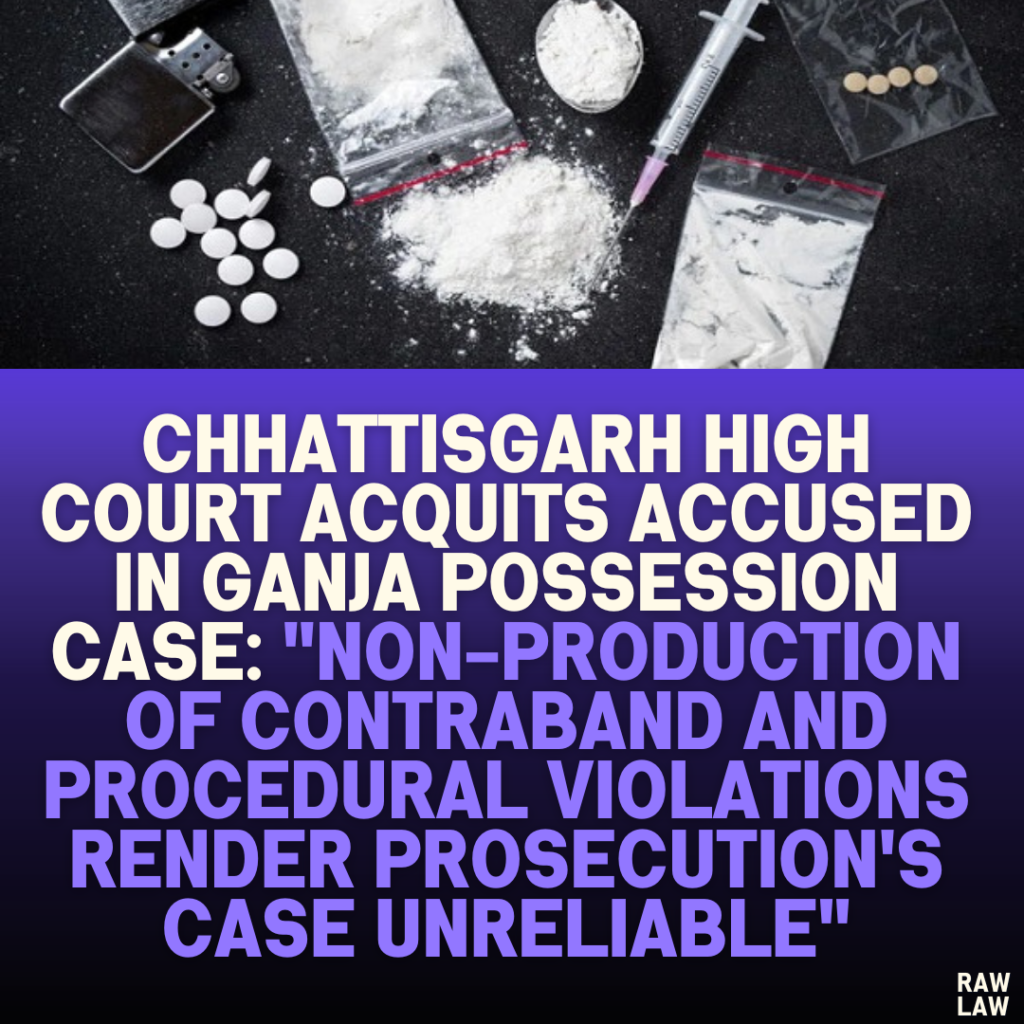Court’s Decision:
The Chhattisgarh High Court acquitted the appellant, setting aside his conviction and 10-year sentence under Section 8 read with Section 20(b)(ii)(C) of the NDPS Act, 1985. The court ruled that procedural lapses, coupled with the prosecution’s failure to produce the seized contraband in court, undermined the case beyond repair.
Facts:
- On October 22, 2003, the appellant was alleged to have been in possession of 66.100 kg of ganja at Durg Railway Station.
- Railway Police intercepted the appellant along with five bags and conducted a search. Contraband was allegedly found in these bags.
- The contraband was weighed at a nearby engineering workshop and samples were drawn before the appellant was arrested. An FIR was lodged, and samples were sent to the Forensic Science Laboratory (FSL).
- The trial court convicted the appellant, sentencing him to 10 years of rigorous imprisonment and imposing a ₹1,00,000 fine. The appellant challenged the conviction on grounds of procedural violations and insufficient evidence.
Issues:
- Did the prosecution conclusively establish that the seized material was ganja as defined under the NDPS Act?
- Was the non-production of the seized contraband and procedural irregularities fatal to the prosecution’s case?
Petitioner’s Arguments:
- Seizure and Possession:
- Independent witnesses (porters Sadashiv and Subhash Yadav) denied the appellant’s involvement in carrying or possessing the bags.
- These witnesses also stated that no search or seizure occurred in their presence, undermining the credibility of the prosecution’s claim.
- Procedural Lapses:
- No duplicate samples were drawn from the seized contraband, violating guidelines under Standing Order 1/89.
- The seized material was not produced in court, and no explanation was provided for its absence.
- Ganja Definition:
- The seized material included stems and leaves, which do not fall under the definition of ganja as per Section 2(iii)(b) of the NDPS Act. Only flowering or fruiting tops qualify as ganja.
- Reliance on FSL Report:
- Without producing the contraband, the FSL report alone could not establish that the substance was ganja.
Respondent’s Arguments:
- The prosecution contended that the seizure was valid and supported by police testimony.
- It argued that the FSL report conclusively proved the seized material was ganja.
- Procedural lapses, if any, were minor and did not affect the outcome of the case.
Analysis of the Law:
- Non-Production of Contraband:
- Citing Vijay Jain v. State of M.P. (2013), the court emphasized that producing the seized contraband is crucial to linking the accused to the offense. Mere oral testimony or an FSL report is insufficient without physical evidence.
- The Supreme Court’s observations in Jitendra v. State of M.P. (2004) reinforced that absence of seized material creates reasonable doubt.
- Ganja Definition:
- As per Section 2(iii)(b) of the NDPS Act, only the flowering or fruiting tops of the cannabis plant constitute ganja. The inclusion of stems and leaves in the contraband raised doubts about its classification.
- Procedural Violations:
- The court noted that the investigating officer failed to adhere to Standing Order 1/89, which mandates drawing duplicate samples for chemical analysis.
- The weighing process was undocumented and lacked verification by independent witnesses, rendering it unreliable.
- Independent Witnesses’ Testimony:
- The two porters, alleged to have carried the bags containing ganja, denied any knowledge of the contraband and stated that no seizure took place in their presence.
- Their testimonies contradicted the prosecution’s narrative and rendered the case suspect.
Precedent Analysis:
- Gaunter Edwin Kircher v. State of Goa (1993): Highlighted the importance of testing each packet individually to confirm the presence of contraband.
- Ashok v. State of M.P. (2011): Held that non-production of seized materials as exhibits in court is fatal to the prosecution’s case.
- Makhan Singh v. State of Haryana (2015): Stressed that the testimony of independent witnesses, if available, cannot be disregarded.
Court’s Reasoning:
- Failure to Establish Possession:
- The prosecution failed to prove that the bags were in the appellant’s possession, as independent witnesses did not support this claim.
- Non-Compliance with Sampling Procedures:
- The failure to draw duplicate samples and document the weighing process violated prescribed guidelines, compromising the chain of custody.
- Absence of Contraband in Court:
- The court observed that the prosecution’s case rested on the physical presence of contraband. Its non-production created a significant gap in evidence.
- Doubt About Contraband Nature:
- The inclusion of non-prohibited parts like stems and leaves further weakened the prosecution’s claim that the material was ganja.
Conclusion:
The High Court acquitted the appellant, holding that:
- The prosecution failed to prove the appellant’s possession of ganja.
- Procedural lapses and non-production of seized contraband were fatal to the case.
- The appellant’s conviction and sentence were set aside, and he was acquitted of charges under Section 8 read with Section 20(b)(ii)(C) of the NDPS Act.
Implications:
This judgment reaffirms the stringent evidentiary and procedural requirements in NDPS cases. It underscores that:
- Non-production of seized contraband significantly weakens the prosecution’s case.
- Compliance with procedural safeguards, such as proper sampling and independent verification, is crucial for a fair trial.
- Courts must scrutinize evidence rigorously in cases involving severe penalties under the NDPS Act.
